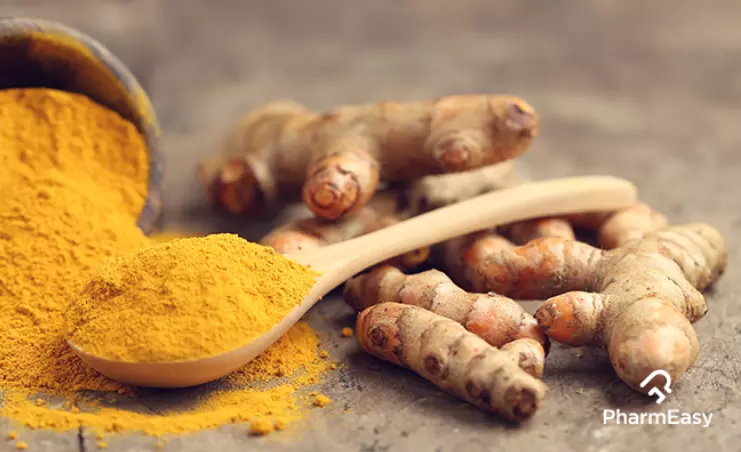13 Health Benefits Of Turmeric (Haldi) That You Should Know
By Dr Prachi Garg +2 more

Get,

to manage your symptom
Get your,


4 Cr+ families
benefitted

OTP sent to 9988776655



You’ve successfully subscribed to receive
doctor-approved tips on
Whatsapp

Get ready to feel your best.

Hi There,
Download the PharmEasy App now!!


Register to Avail the Offer
Send OTPBy continuing, you agree with our Privacy Policy and Terms and Conditions

Hi There,
Sign up on PharmEasy now!!
Trusted by 4 crore+ families

OTP sent to 9988776655



You have unlocked 25% off on medicines




Code: NU25
By Dr Prachi Garg +2 more
Table of Contents
A close cousin in looks and appearance to the quintessential ginger. Turmeric roots are used fresh or boiled in water and dried, after which they are ground into a powder. Turmeric powder is sunset-yellow in colour. It has a slightly pungent, bitter flavour and earthy aroma.
Turmeric contains curcuminoids like curcumin which imparts a vibrant yellow colour, dimethoxy curcumin and bisdemethoxycurcumin and volatile oils like turmerone, atlantone, zingiberone and sugars, proteins and resins.

Turmeric has been used by Ayurvedic healers as medicine since the olden days. Popularly known as Haldi, this powerful spice is also a go-to option while dealing with numerous health ailments. Whether consumed or applied, its benefits are plentiful.
Did you know?
Research has shown curcumin to be highly effective in reducing inflammation. The anti-inflammatory effect of curcumin is most likely mediated through its ability to inhibit cyclooxygenase-2 (COX-2), lipoxygenase (LOX) and inducible nitric oxide synthase (iNOS).
Read More: 10 Anti-Inflammatory Food to Include in Your Diet.
Let me tell you a secret! A study was conducted on guinea pigs and rat muscles and it suggests that turmeric may ease menstruation cramps. Turmeric is well known for its anti-inflammatory properties that may ease abdominal pain and other symptoms associated with periods.
Dr. Siddharth Gupta, B.A.M.S M.D (Ayu)
Curcumin is also a powerful anti-oxidant and thus protects our body from free radicals, reducing the risk of heart disease and cancer.
Curcumin present in turmeric delays the onset of type 2 diabetes by inhibiting the formation of inflammatory cytokines and thus having a favourable effect on blood glucose levels.
Turmeric also boosts immunity levels. Its anti-bacterial, anti-viral and anti-fungal properties protect us from a variety of infections. Many doctors highly recommend taking a teaspoon full of Turmeric in a glass of warm milk every day to keep the common cold and flu at bay.
The antioxidant property of curcumin found in turmeric may prevent heart diseases and diabetic cardiovascular complications. Curcumin also reduces serum cholesterol levels and protects against the pathological changes occurring with atherosclerosis.
It should come as no surprise that turmeric is suggested as a headache remedy, especially for migraines, given that its related family member, ginger is a well-known natural headache reliever. Despite online acclaim, there isn’t much proof that turmeric may get rid of headaches, however, one research does suggest it might be a part of a novel strategy.
Dr. Rajeev Singh, BAMS
Curcumin interferes with the growth and development of cancer cells and prevents their spread at the minutest molecular level. Thus, it effectively reduces the risk of new cancerous growth.
Alzheimer’s disease is caused due to build-up of protein tangles called amyloid plaques. Curcumin in turmeric helps in clearing these plaques.
Curcumin boosts BDNF( brain-derived neurotrophic factor) levels in the brain, thus helping patients with depression.
Curcumin also boosts the brain neurotransmitters serotonin and dopamine.
Read More: 15 Ways to Treat Depression Naturally
The antioxidant properties of curcumin in turmeric prevent damage to the cells and thus slow down ageing. It effectively prevents the formation of fine lines and wrinkles.
Curcumin also stimulates new cell growth.
Supplements of Curcumin when given to patients suffering from rheumatoid arthritis, shows significant improvements in pain and joint functioning.
Curcumin also safeguards bone tissue and prevents bone loss.
Read More: 10 Foods to Strong & Healthy Bones.
Curcumin in turmeric reduces bloating and brings the digestive system on track. It stimulates the gallbladder to produce bile. It also helps in preventing and treating pancreatitis.
The anti-oxidant property of Turmeric helps in treating glaucoma and cataracts. Regular consumption of Turmeric halts the progression of glaucoma and also prevents vision loss too.
Turmeric has anti-inflammatory, antimicrobial and antioxidant properties that can help to:
Read More: 7 Home Remedies for Glowing Skin
It is not advisable to consume more than 5 tsp of turmeric per day.
Read More: 10 Health Benefits of Garlic.
Disclaimer: The information provided here is for educational/awareness purposes only and is not intended to be a substitute for medical treatment by a healthcare professional and should not be relied upon to diagnose or treat any medical condition. The reader should consult a registered medical practitioner to determine the appropriateness of the information and before consuming any medication. PharmEasy does not provide any guarantee or warranty (express or implied) regarding the accuracy, adequacy, completeness, legality, reliability or usefulness of the information; and disclaims any liability arising thereof.
Links and product recommendations in the information provided here are advertisements of third-party products available on the website. PharmEasy does not make any representation on the accuracy or suitability of such products/services. Advertisements do not influence the editorial decisions or content. The information in this blog is subject to change without notice. The authors and administrators reserve the right to modify, add, or remove content without notification. It is your responsibility to review this disclaimer regularly for any changes.

Leave your comment...
Comments